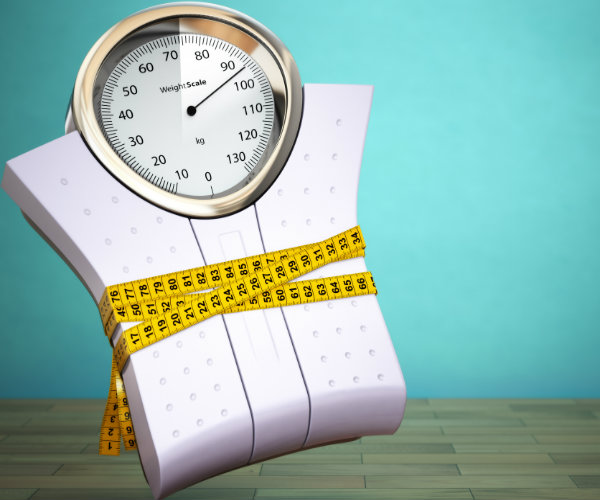“When we try to lose fat, our body gets alarmed and tries to protect it,” Dr. Sylvia Tara, Ph.D., tells Newsmax Health.
Tara understands this struggle well.
“I gain weight very easily, and I’ve always tried to lose it, so it finally got to the point where I decided I’m going to figure this out,” says Tara, author of the new book, “The Secret Life of Fat.”
Tara, who holds a doctorate in biochemistry, spent five years researching all aspects of body fat. What she found is that fat, which is so often reviled, serves an important purpose, but that there are effective strategies to shed excess pounds.
“Our fat is actually an essentially and critically misunderstood organ, as vital to our health as our heart, lungs or stomach," she explains.
“The hormones that fat secretes affect many of our vital functions, including our reproductive organs, as well as affecting brain size, bone strength, and even how well our wounds heal.”
But what surprised her is the power fat has – not only over our health, but also our thought processes.
“Our fat produces the hormone leptin, which signals to our brain that we have enough fat and we don’t need to eat in abundance," she explains. "But as we lose fat, the amount of leptin is reduced, so our brain goes into overdrive, and we get hungrier and want bigger portions.”
According to Tara, weight loss can actually boost our appetite and lower metabolism.
“The leptin released from fat also affects muscle and our thyroid function. So less leptin causes less fat to burn. It’s fat’s own way of protecting itself against loss,” she notes.
Someone who weighs 170 pounds and loses 20 will have to cut his or her calorie consumption by 22 percent just to stay at that 150 pounds due to the lowering of metabolism.
"When people try to lose fat, the body tries to protect it, and has mechanisms to do this, and to make you gain the weight back," she explains. "You may think your failing on your diet, but it’s just your fat fighting you back.”
But losing weight can be done – you just have to know how, says Tara.
“Fat is clever, and fat can fight back, but knowledge is power, so if you are aware of what’s happening, you can fight back,” she explains.
Here are five key factors that drive obesity:
Genetics: Obesity that runs in families has been tied to a genetic variation called FTO, which causes cravings for high-calorie foods.
Gender: If you’ve ever observed that it’s easier for men to lose weight than women, research bears this out. “Women store fat at two to three times the rate that men do, but when they exercise, they actually burn more fat than men. This may seem like an upside, but the downside is that women also get hungrier after exercise compared to men, so they may want to exercise a little less intensely,” Tara says.
Hormones: Our fatty tissue produces leptin, which acts in opposite to the so-called “hunger” hormone, “ghrelin.” Leptin travels through the bloodstream, and binds to the brain’s hypothalamus, to make us feel full. But when fat is lost, the production of this hormone goes down, which makes us feel hungrier.
Viruses: A virus, known as Ad-36 can causeobesity. You may be unaware that you’ve caught it, but it can have lasting effects on your body .One study showed that 30 percent of obese subjects had been infected with it, versus 11 percent of those who were not obese – a 3-to-1 ratio.
Your microbiome: Depending on the distribution of the bacteria in your intestine, you may be thinner or fatter, as some gut microbes are more efficient at extracting calories from food than are others.
Here are Tara’s top tips on how to outsmart your fat:
Choose the right diet: Find a diet that includes foods you like and fits your lifestyle, because once you've lost the fat, you’ll have to watch what you eat for life. Diets that are very restrictive that limit certain foods have high failure rates because dieters don’t maintain that lifestyle for long.
Get active: Exercise increases levels of brown fat, the fat that burns calories, and boosts levels of testosterone and growth hormone – both which burn fat.
High intensity interval training: This is a form of cardiovascular exercise strategy that involves alternating short periods of intense exercise with more moderate bursts. It is the best way to get a vigorous workout in a short period of time. But if this isn’t for you, don’t worry; even people who engage in easier recreational activity or casual backyard sports lose more weight than those who don’t do anything.
Try intermittent fasting: This is an eating plan cycles between fasting and non-fasting. It can involve simply leaving a 16-hour fasting window between diner and breakfast. You can accomplish this by eating supper earlier and eating later after you awaken. Such fasting overnight increases levels of growth hormone, which helps burn fat, and curbs appetite.
Build up willpower: Willpower is like a muscle – it can be trained. Pick a non-food habit you want to build up, like making your bed every morning. You’ll find that building up discipline will help you when you are sticking to a diet as well.
Practice temptation bundling: Try pairing a pleasant task with an unpleasant chore, such as listening to music while you work out.
Be forgiving: At some point, you are going to go off your diet, and by forgiving yourself, and going back on it, you’ll help to ensure your long-term success.
